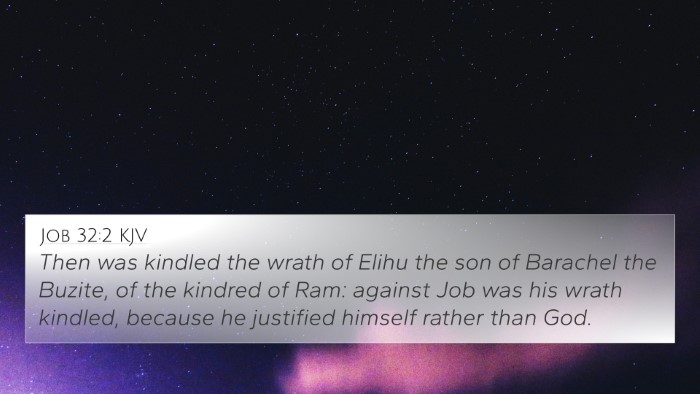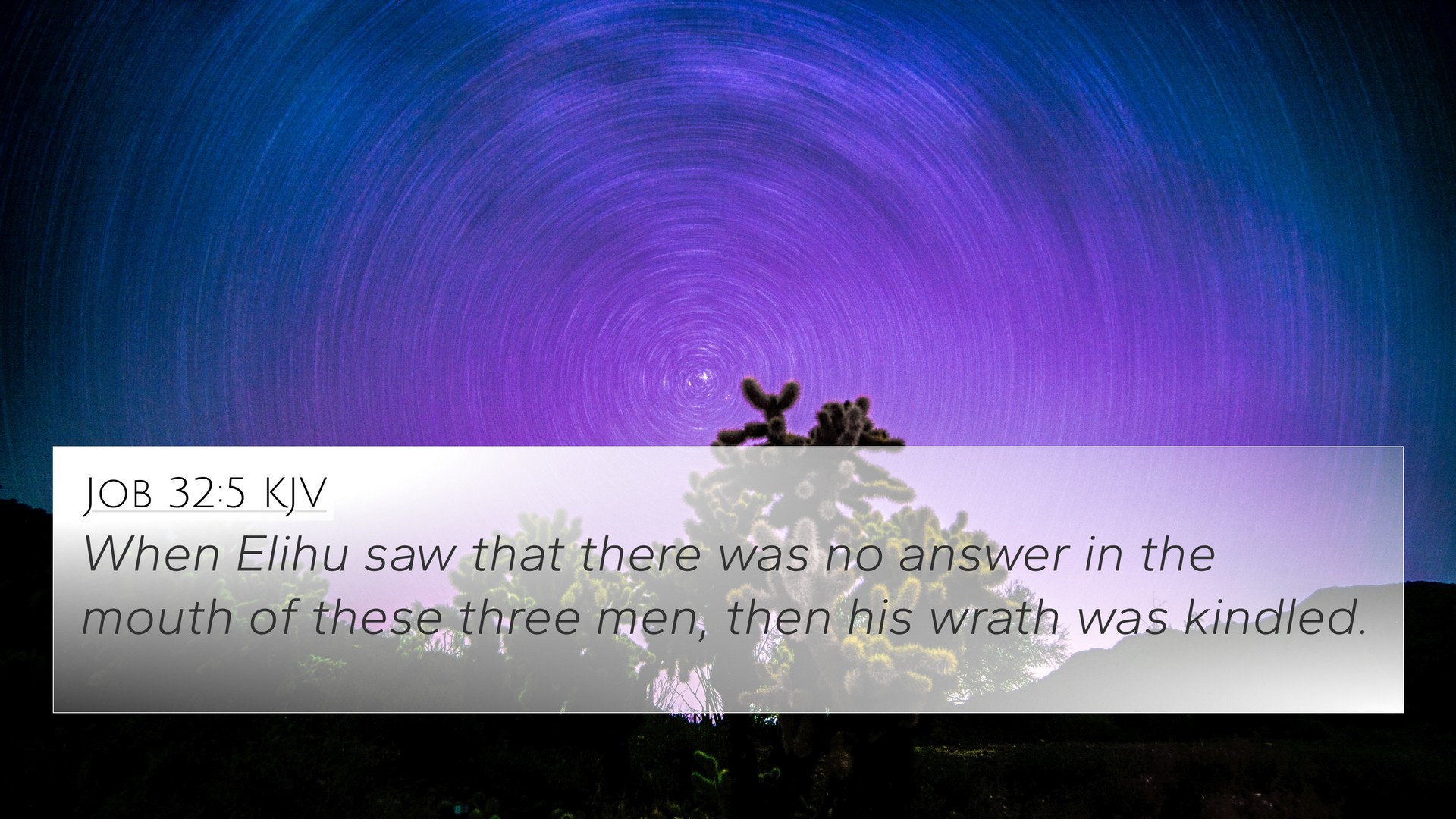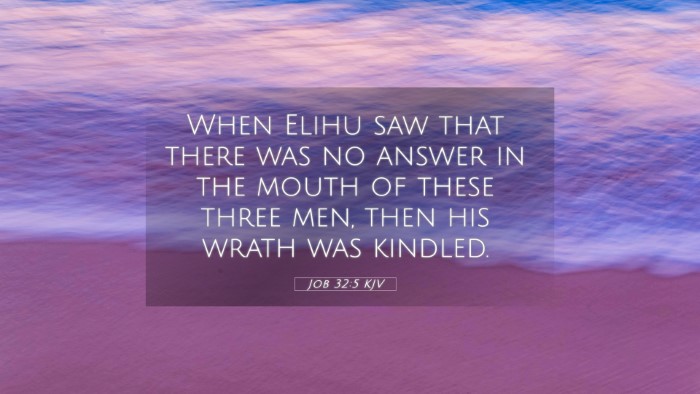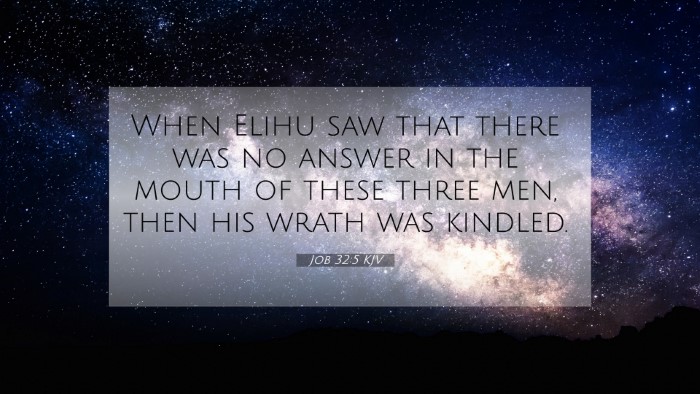Old Testament
Genesis Exodus Leviticus Numbers Deuteronomy Joshua Judges Ruth 1 Samuel 2 Samuel 1 Kings 2 Kings 1 Chronicles 2 Chronicles Ezra Nehemiah Esther Job Psalms Proverbs Ecclesiastes Song of Solomon Isaiah Jeremiah Lamentations Ezekiel Daniel Hosea Joel Amos Obadiah Jonah Micah Nahum Habakkuk Zephaniah Haggai Zechariah MalachiJob 32:5 Similar Verses
Job 32:5 Cross References
When Elihu saw that there was no answer in the mouth of these three men, then his wrath was kindled.
Uncover the Rich Themes and Topics of This Bible Verse
Listed below are the Bible themes associated with Job 32:5. We invite you to explore each theme to gain deeper insights into the Scriptures.
Job 32:5 Cross Reference Verses
This section features a detailed cross-reference designed to enrich your understanding of the Scriptures. Below, you will find carefully selected verses that echo the themes and teachings related to Job 32:5 KJV. Click on any image to explore detailed analyses of related Bible verses and uncover deeper theological insights.

Exodus 32:19 (KJV) »
And it came to pass, as soon as he came nigh unto the camp, that he saw the calf, and the dancing: and Moses' anger waxed hot, and he cast the tables out of his hands, and brake them beneath the mount.

Job 32:2 (KJV) »
Then was kindled the wrath of Elihu the son of Barachel the Buzite, of the kindred of Ram: against Job was his wrath kindled, because he justified himself rather than God.
Job 32:5 Verse Analysis and Similar Verses
Understanding Job 32:5
Bible Verse: "But when Elihu saw that there was no answer in the mouth of these three men, then his wrath was kindled."
Job 32:5 marks a significant turning point in the dialogue between Job and his friends. Here is a summarized interpretation of this verse based on insights from public domain commentaries.
Summary of Insights
In this verse, Elihu, a younger man among Job's friends, observes the silence of the three older companions, who have failed to respond adequately to Job’s suffering and claims of innocence. His observation ignites a sense of indignation, showcasing a shift in the conversation. Elihu’s wrath is not directed at Job but rather at the inability of the three friends to provide a truthful and empathetic answer. This silence could also symbolize the limitations of human wisdom in the face of divine mystery.
Key Themes
- Divine Wisdom vs. Human Understanding: Elihu’s emergence signifies a newer perspective that aims to bring clarity and depth to the discussions surrounding suffering and righteousness.
- The Role of Anger: Elihu's anger acts as a motivator for him to speak; it reflects the frustration that arises from witnessing an inadequate defense of God’s justice.
- Silence in Dialogue: The inability of Job’s friends to respond highlights the challenges in understanding divine intent and justice in human suffering.
Bible Cross-References
Here are some related verses that provide further connections and thematic analysis:
- Proverbs 18:2 - "A fool takes no pleasure in understanding, but only in expressing his opinion."
- Ecclesiastes 5:3 - "For a dream comes with much business, and a fool's voice with many words."
- James 1:19 - "Know this, my beloved brothers: let every person be quick to hear, slow to speak, slow to anger."
- 1 Corinthians 1:25 - "For the foolishness of God is wiser than men, and the weakness of God is stronger than men."
- Job 13:5 - "If only you would be altogether silent! For you, that would be wisdom."
- Job 32:10 - "Therefore I say, 'Listen to me; I too will tell what I know.'
- Job 33:13 - "Why do you contend against him, saying, 'He will answer none of man's words?'
- Psalm 107:43 - "Whoever is wise, let him heed these things and consider the great love of the LORD."
- Proverbs 1:23 - "If you turn at my reproof, behold, I will pour out my spirit to you; I will make my words known to you."
- Isaiah 55:8-9 - "For my thoughts are not your thoughts, neither are your ways my ways, declares the LORD."
Connecting Themes Across Scripture
The connections between these verses reveal a recurring theme of human limitations in understanding divine will and the significance of wisdom in speaking on matters of faith and suffering. Elihu’s role symbolizes a voice that challenges complacency and encourages deeper contemplation about God's nature.
Conclusion
Job 32:5 serves as a pivotal instance highlighting the complexity of theological discourse found throughout the Bible. Elihu’s reaction to the silence of Job's friends emphasizes the necessity for sincere dialogue grounded in wisdom and Divine understanding. Reflecting upon this verse in conjunction with the related scriptures enriches one’s grasp of the overall themes concerning God’s justice, human suffering, and the wisdom inherent in biblical teachings.
Further Study and Tools
- Utilizing a Bible Concordance can aid in finding verses that correspond with themes presented in Job 32:5.
- Engage in Bible cross-reference study to deepen understanding of similar contexts.
- Explore comprehensive Bible cross-reference materials to identify thematic connections across different books.
Key Takeaways
Job 32:5 encourages readers to reflect on the complexities of dialogue concerning suffering and wisdom, inviting deeper exploration of God’s nature and the mysteries of faith.


